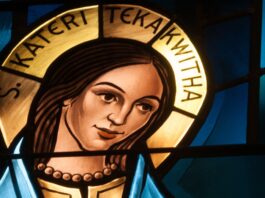
“From the blood of martyrs, saints are born.” It was nine years after the brutal tomahawking of Jesuits Isaac Jogues and John de Brebeuf by Iroquois warriors, that a baby girl came into the world, close to the site of their sacrifice, in Auriesville, New York.
Her mother, a Christian Algonquin, had been taken captive by the Iroquois, later becoming the wife to the chief of the fierce Mohawk clan – the most audacious among the Five Nations. Tragedy struck young Kateri at the age of four when a smallpox epidemic claimed the lives of her parents and little brother, leaving her scarred and nearly blind. Her uncle, who had ascended to the position of chief after her father’s death, took her in.
Although her uncle was no friend to the Blackrobes, the Jesuit missionaries, he was powerless against them due to a peace treaty with the French, which mandated their presence in villages with Christian captives. Despite the fear of her uncle’s wrath, Kateri was stirred by the teachings of the three Blackrobes who stayed in her uncle’s house. She refrained from seeking instruction, though, and also declined to marry a Mohawk warrior. It was at the age of 19 that Kateri mustered the courage to embrace her faith, and was baptized as Kateri, meaning Catherine, on Easter Sunday.
Her baptism marked the beginning of her life as a perceived slave. For refusing to work on Sundays, she was denied food. But her spiritual strength only grew with time. She spoke to a missionary about her profound reverence for the sanctity of baptism, and the incredible love of God for humanity that moved her deeply.
Despite the constant threat due to the ire her conversion and pious life had aroused, Kateri continued on her spiritual path. Following a priest’s advice, she undertook a daring 200-mile journey on foot to the Christian Indian village of Sault St. Louis, near Montreal.
Over the next three years, under the guidance of a priest and an elder Iroquois woman, she flourished in her faith, dedicating long hours to prayer, charity, and demanding penance. At 23, she took a vow of virginity, an extraordinary act for an Indian woman, as their futures often depended on marriage. Even when faced with accusations of meeting a man during her solitary prayer sessions in the woods, her commitment to her vow remained unbroken.
Her aspirations extended to establishing a religious community for women after visiting Montreal, but she was discouraged by a local priest. Accepting this with humility, she decided to lead an “ordinary” life, filled with fervent prayers and harsh fasting, in the hope of the conversion of her people. Kateri passed away the day before Holy Thursday, and those present witnessed a miraculous transformation of her emaciated, scarred face into that of a healthy child, a peaceful smile gracing her lips. She was beatified in 1980.
Saint Kateri Tekakwitha, the humble and brave maiden, was canonized by Pope Benedict XVI on October 21, 2012.
Editorial credit: Nancy Bauer / Shutterstock.com
The post Saint Kateri Tekakwitha appeared first on uCatholic.
Daily Reading
Memorial of Saint Maximilian Kolbe, Priest and Martyr
Readings for the Memorial of Saint Maximilian Mary Kolbe, Priest and Martyr Reading 1 EZ 9:1-7; 10:18-22 The LORD cried loud for me to hear: Come, you scourges of the…
Daily Meditation
We Belong to Each Other
Click here for daily readings Every time I watch the altar server carrying the cross and leading the procession to the altar while the entrance hymn is sung, I feel…




